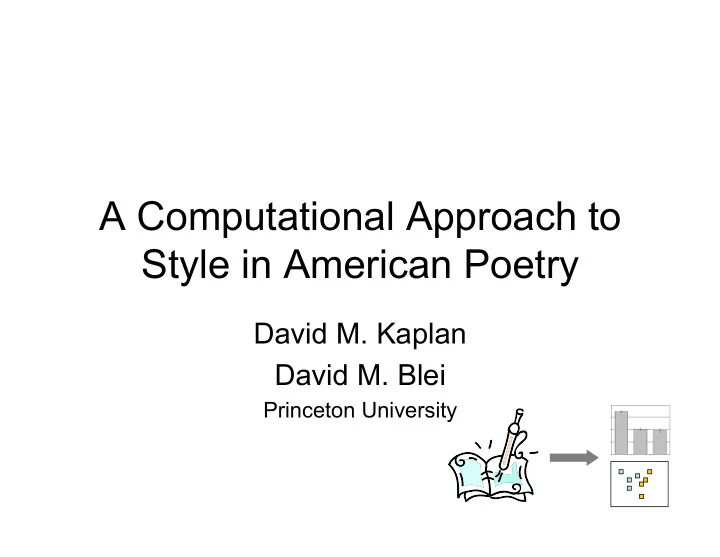

A Computational Approach to Style in American Poetry David M. Kaplan David M. Blei Princeton University
Our Mission • Text analysis has focused on prose • We want to analyze poetry • Important differences
Prose vs. Poetry Computational Text Analysis Prose Poetry State of the art Relatively Relatively developed non-existent! Focus Content Style Methods Bag of words Bag of words? Applications Classification, Academic, information personal
What is Style? Coordinating Conjunctions First person Lots of perfect rhyme Two roads diverged in a yellow wood, And sorry I could not travel both And be one traveler, long I stood And looked down one as far as I could To where it bent in the undergrowth; Moderate amount of 7.4 words per line (avg) (action) verbs: diverged, 5 lines per stanza stood, looked, etc.
Features of Style • Orthographic – Word count; # of lines; # of stanzas; avg. line length; avg. word length; avg. # of lines per stanza; most frequent noun / adjective / verb • Syntactic – Frequencies of: parts of speech; punctuation; contractions • Phonemic – Frequencies of: rhyme (identity, perfect, semi, slant); sound devices (alliteration, assonance, consonance)
Method Overview Statistical Poems Metrics Vectors Analysis Two roads (noun frequency, (0.1428, 0, …) diverged in a alliteration, …) yellow wood… PCA Visualization (0.63, 0.2) (0.45, 0.99) …
Frost v. Glück v. Millay: Select Features First person singular Coordinating Poet Perfect Rhyme pronoun Conjunction Frost 0.278 0.063 0.063 Glück 0.000 0.000 0.000 Millay 0.139 0.032 0.104 Two roads diverged in a yellow \ Now, in twilight, on the palace steps Or nagged by want past \ wood, the king asks forgiveness of his \ resolution's power, And sorry I could not travel both lady. I might be driven to sell your love \ And be one traveler, long I stood for peace, And looked down one as far as I \ He is not Or trade the memory of this night \ could duplicitous; he has tried to be for food. To where it bent in the undergrowth; true to the moment; is there \ It well may be. I do not think I would. another way of being true to the self?
Visualization
Moore and Frost
Moore, Frost, and O’Hara
Titles Back Legend : 1-7, Frost; 8-10, Whitman; 11-14, Williams; 15-20, Stevens; 21-24, Sexton; 25-29, Plath; 30, Pinsky; 31-32, Pound; 33-37, Millay; 38, Ginsberg; 39-44, Glück; 45-46, Eliot; 47-49, Dickinson; 50-51, Cummings; 52-55, Bishop; 56-57, Smith.
Statistical Analysis
Plot Oxford Anthology
Plot Oxford Anthology
Comparison with Bag of Words: Oxford Anthology
Comparison with Bag of Words: Three Collections
A Computational Approach to Style in American Poetry • We developed a novel quantitative method of feature analysis for poetry • Similarity across a collection can be visualized to show patterns • Our method outperforms word occurrence, using authorship as proxy for stylistic similarity David M. Kaplan – dkaplan@alumni.princeton.edu David M. Blei – blei@cs.princeton.edu
Appendix
Back Oxford Anthology Plot Titles
Plot Moore and Frost
Plot Moore, Frost, and O’Hara Including outlier “Song (Is it dirty)” Excluding outlier “Song (Is it dirty)”
Recommend
More recommend